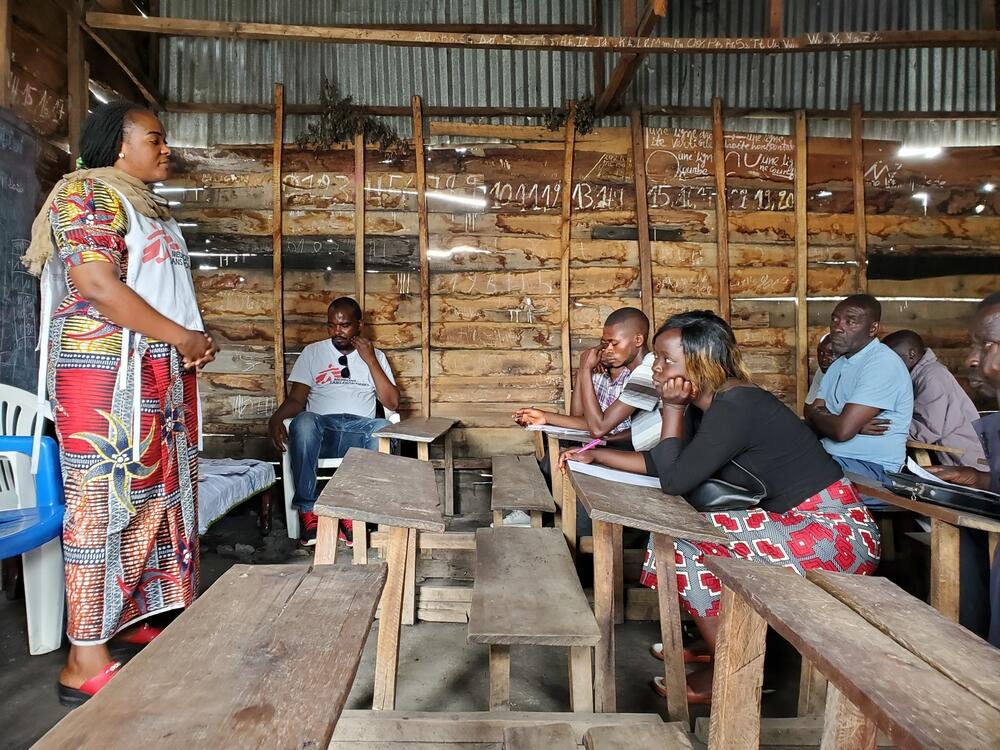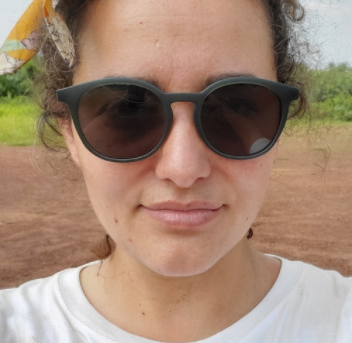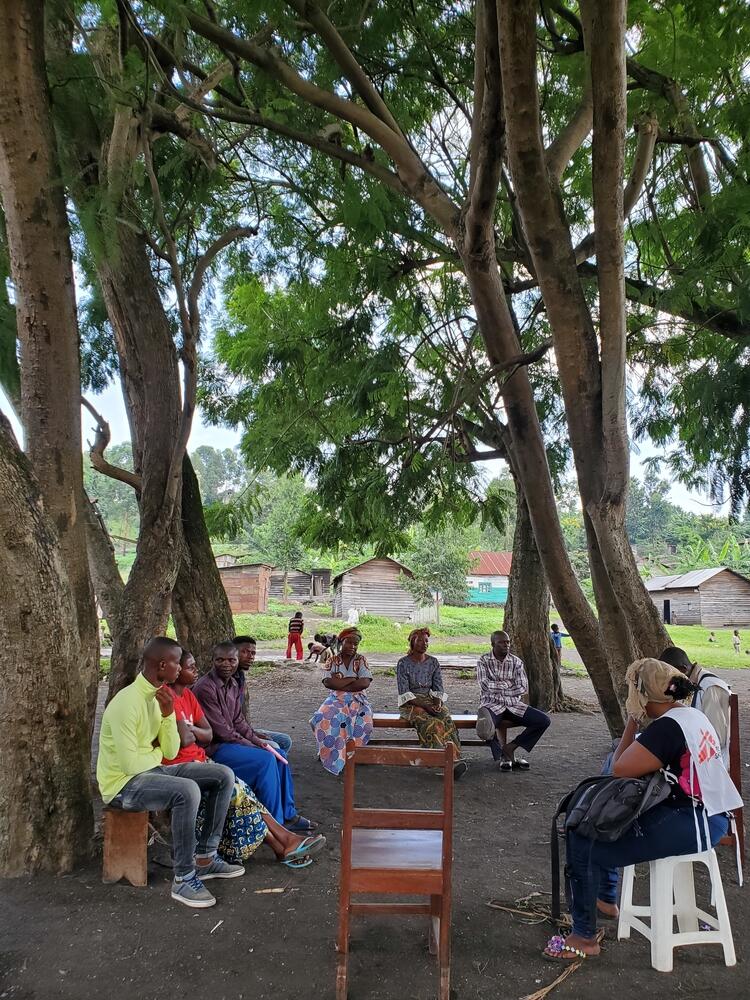COVID-19: Debunking myths and quelling fears in Congo
“Corona is just another way for the government to kill us since Ebola didn’t work.”
“All white people are infected with corona.”
“We can’t wash our hands. We have no water. We have no soap. How can we protect ourselves?”
“The virus doesn’t affect Africans, only Europeans.”
I write down all of the questions and thoughts in my notebook and try to answer their concerns and questions as best I can. Any questions I can’t answer, I promise to find an answer and come back to them soon.
I am working in Goma as a health promotion activity manager and my team and I are holding an information session for a group of volunteer community health workers. We are sitting in an empty classroom that has no floors and wooden benches that we are perched on – distancing ourselves as much as possible.
It is the middle of March and COVID-19 has now arrived in the Democratic Republic of Congo (DRC).
People are filled with questions and concerns, and as the health promotion team, it is our job to engage with the community, to provide them with accurate information and most importantly to listen to them, to hear their concerns.
First Ebola, now COVID-19
The arrival of COVID-19 in the DRC came just as the Ebola epidemic, which has killed 2,200 people since 2018, was on the verge of being declared over. This was before more Ebola cases emerged in the country on 10 April.
For many Congolese, particularly those in the Ebola-affected areas, they tell us the timing is suspicious – is COVID-19 just another disease created to kill them?
Is this a political tactic? Is this just another way for NGOs and the government to make money?
"COVID-19 is complicated around the world but in countries like the DRC, the challenges are exacerbated by persistent extreme poverty, instability, conflict and a healthcare system that is barely functioning"
It’s understandable why people are sensitive to rumours or distrustful. The term “Ebola-business” has become commonplace now after people saw huge amounts of money and resources flowing into their region purely for the Ebola response.
Yet Ebola was only one of the many emergencies, with the country also dealing with the world’s worst measles outbreak, malaria, ongoing conflict and displacement.
This led to a perception amongst many people that Ebola was a business to make money while the actual urgent needs of the population were ignored.
The danger of rumours
Managing these rumours and suspicions has become a major part of my job.
The spread of false information in the form of rumours is dangerous for Congolese and NGOs alike.
Downplaying the severity and reality of the COVID-19 pandemic by believing it to be a manmade political tactic will result in people not following the prevention measures laid out by the authorities, leading to higher mortality and potential backlash and violence.
Addressing these rumours is a careful balance of listening to their views and respecting their beliefs, and gently correcting inaccuracies.
Through these sessions with the community, we have learned that the main concerns of community members have less to do with contracting the actual virus and more to do with the threat of a government-imposed lockdown and the incapability of the current health system to care for them.
“So many people are dying in Italy, where they have good hospitals. How will we manage here when there are no hospitals?”
“We cannot stay in our houses, we will starve.”
Overcoming fears
Their fears are valid – the reality the Congolese are facing is severe and with potentially deadly consequences that go beyond the virus.
Our discussions with community members have also made us aware of a growing fear of health centres – people are avoiding them for fear of catching COVID-19 and healthcare workers are scared of treating incoming patients.
“Can I still go to the hospital if I have malaria?”
“Won’t I get infected with corona if I go to the hospital where there is a confirmed case?”
“Is it safe to touch the bodies of people who have died from corona?”
"This is why proactive health promotion is so important during this time - people need answers to their questions from a source they can trust"
When we understand what the population is scared of and what rumours they believe, we can develop an outreach strategy that addresses the nuances and realities of each area where MSF is working.
It is why discussions and information sessions are so important, especially during the COVID-19 era.
112,000
MSF CONSULTATIONS FOR COVID-19 IN 2020
15,400
COVID-19 PATIENTS ADMITTED TO AN MSF HOSPITAL IN 2020
6%
WILL REQUIRE CRITICAL CARE
The underlying issues
COVID-19 is complicated around the world but in countries like the DRC, the challenges are exacerbated by persistent extreme poverty, instability, conflict and a healthcare system that is barely functioning.
It is a country where rumours spread easily, with simmering armed conflict and with people that are constantly on the move to escape the latest waves of violence from armed groups.
“How can we protect ourselves when there are new internally displaced people arriving? How do we know where they come from?”
“I can’t afford to buy enough food for my family anymore since the price has gone up.”
At the end of the day, many people in Goma are scared. People everywhere are scared.
Nobody knows what the coming months may bring.

Help us prepare for the next emergency
Health promotion is critical
This is why proactive health promotion is so important during this time – people need answers to their questions from a source that they trust. People need their fears to be heard and calmed. People need to have access to accurate information.
During times as uncertain as these, health promotion becomes a critical activity. It is how we connect and engage with people, how we learn about their fears and beliefs and needs.
Community engagement informs the type of response that is needed in the community and helps MSF develop effective and appropriate interventions to support the population.
And so our health promotion teams will continue travelling into the community, as long as the situation allows, to listen, to ask questions, and to give the community a voice and make sure that the population we serve are at the centre of MSF’s response.
MSF and COVID-19
COVID-19 is a viral disease that affects the respiratory system.
The high level of medical care patients require has put some of the world’s most advanced healthcare systems under extreme pressure.
Médecins Sans Frontières/Doctors Without Borders (MSF) is deeply concerned about how COVID-19 will affect people living in more precarious environments, such as conflict zones, refugee camps, and places with very limited access to healthcare.


